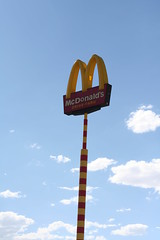 What value do newspapers add to information? A couple of days ago, I bookmarked this piece on product placement, from the New York Times. Basically, it’s about coffee cups appearing on the desk during a local morning news show in Las Vegas.
What value do newspapers add to information? A couple of days ago, I bookmarked this piece on product placement, from the New York Times. Basically, it’s about coffee cups appearing on the desk during a local morning news show in Las Vegas.
The Las Vegas Sun reported it first on Monday:
Oooooooh, they’re calling out your name.
Two cups of McDonald’s iced coffee (BUY!) sit on the Fox 5 TV news desk, a punch-you-in-the-face product placement (BUY!) to chase down your morning news.
Quoted? Fox 5 news director, Adam Bradshaw, and Kelly McBride of the journalism ethics outifit, Poynter. The New York Times hat tips the Las Vegas Sun, ditches the breezy style – and the line that the coffee and ice cubes are fake – and clocks up eight quoted sources in under a thousand words.
And then Tom Leonard of the Telegraph told it yesterday, with a little historical colour and just a quote from Bradshaw. He mentioned both the NYT and LVS. The Guardian‘s Ed Pilkington popped in an additional quote from a hitherto unheard-from Poynter pundit.
So what’s the benefit here? Are rewrites journalism? Is the news business busy eating itself?
The original ‘fun’ piece got the ‘shock and awe’ treatment from the NYT, before being translated back into something for a different audience. Would Roy Greenslade‘s presentation – in a blog with the relevant links – have been the best way to tell the story online?
Jeff Jarvis argued in Cover What You Do Best, Link To The Rest:
In the rearchitecture of news, what needs to happen is that people are driven to the best coverage, not the 87th version of the same coverage.
Well yes, journalism is on one level about information, but it’s all about audience. Most Telegraph and Guardian readers – in their capacity as information absorbers rather than seekers – probably don’t subscribe to the NYT media section, or care about the story sufficiently to enter into it with the depth and gravity of the NYT, or even want to click through to it, but they might want to be aware of it. And they might want that packaged in a casual but entertaining way.
This is where the British journalistic tradition of caring more about the written word (see restaurant critic Giles Coren‘s impassioned defence of the indefinite article here), than perhaps the facts (see the FT‘s Gideon Rachman on US vs UK journalism), conflicts with Jarvis’ idea of a commoditised, fact-based media.
My solution to that conflict? Arm-wrestling.
One response to “The teller not the tale: link based journalism and rewrites”
[…] public links >> onlinejournalism [from kristilo] The teller not the tale: link based journalism and… Saved by p3Starlight on Tue 03-2-2009 [from shawn.smith] What online news producers can learn […]